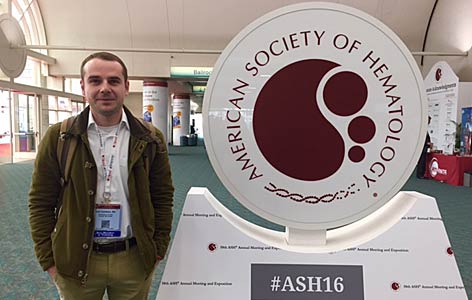Home page Description:
Clinicians, scientists and trainees meet at the American Society of Hematology Annual Meeting.
Posted On: January 19, 2017

Image Caption:
Conference attendee, Irakli Dzneladze, PhD Candidate. Supervisor: Dr. Mark Minden, PM.
Conference: 58th American Society of Hematology (ASH) Annual Meeting & Exposition, December 3-6, 2016, San Diego, CA, USA
Conference Highlight: Advances in single-cell profiling and cell sorting are allowing researchers to better understand hematopoiesis and how its dysregulation can lead to disease.
Conference Article: The ASH Annual Meeting brings together thousands of clinicians, researchers and trainees from the field of hematology and provides a platform for attendees to share their research and clinical experience. This year the conference included sessions focusing on clinical trial results, novel prognostic markers, advances in chimeric antigen receptor (CAR) T-cell therapy, and novel cell profiling technology.
Hematopoiesis is a complex process where immature blood cells respond to internal and external signals to decide when and how to differentiate. Development of single-cell molecular profiling technology has given us an unprecedented look into the mechanisms involved in these decision-making processes and insight into the structure of the human hematopoietic system.
Novel cell surface markers can now be used to purify hematopoietic stem cells at 67% purity and profiled on a single-cell basis (Dr. Bertie Göttgens). Study of mutation accumulation in hematopoietic stem cells allows us to track their lineage and history of quiescence (Dr. Liran Shlush). Current adult hematopoietic hierarchy structure has been challenged with recent evidence demonstrating absence of oligopotent progenitors in the adult bone marrow (Dr. John Dick). Single-cell tracking over the course of several days allows us to predict hematopoietic differentiation fate based on behavior (Dr. Timm Schroeder).
Though CD19 CAR T-cell therapy has been used to achieve durable remission in a high percentage of B-cell malignancies, failure can occur due to poor T-cell expansion, resistant leukemia, or lack of CAR T-cell persistence. CD19 negative relapse can occur following CAR19-targeted immunotherapy, thus prohibiting use of CAR T-cell therapy on relapsed disease. To combat this, CD22 targeted CAR T-cell therapy has been developed (Dr. Terry Fry). CAR T-cells targeting both CD19 and CD22 simultaneously perform better than either of the single CAR T-cells.
This report describes only some of the research presented at the meeting. However, abstracts for all sessions can be accessed on the ASH website at: http://www.hematology.org/Annual-Meeting/
Conference Highlight: Advances in single-cell profiling and cell sorting are allowing researchers to better understand hematopoiesis and how its dysregulation can lead to disease.
Conference Article: The ASH Annual Meeting brings together thousands of clinicians, researchers and trainees from the field of hematology and provides a platform for attendees to share their research and clinical experience. This year the conference included sessions focusing on clinical trial results, novel prognostic markers, advances in chimeric antigen receptor (CAR) T-cell therapy, and novel cell profiling technology.
Hematopoiesis is a complex process where immature blood cells respond to internal and external signals to decide when and how to differentiate. Development of single-cell molecular profiling technology has given us an unprecedented look into the mechanisms involved in these decision-making processes and insight into the structure of the human hematopoietic system.
Novel cell surface markers can now be used to purify hematopoietic stem cells at 67% purity and profiled on a single-cell basis (Dr. Bertie Göttgens). Study of mutation accumulation in hematopoietic stem cells allows us to track their lineage and history of quiescence (Dr. Liran Shlush). Current adult hematopoietic hierarchy structure has been challenged with recent evidence demonstrating absence of oligopotent progenitors in the adult bone marrow (Dr. John Dick). Single-cell tracking over the course of several days allows us to predict hematopoietic differentiation fate based on behavior (Dr. Timm Schroeder).
Though CD19 CAR T-cell therapy has been used to achieve durable remission in a high percentage of B-cell malignancies, failure can occur due to poor T-cell expansion, resistant leukemia, or lack of CAR T-cell persistence. CD19 negative relapse can occur following CAR19-targeted immunotherapy, thus prohibiting use of CAR T-cell therapy on relapsed disease. To combat this, CD22 targeted CAR T-cell therapy has been developed (Dr. Terry Fry). CAR T-cells targeting both CD19 and CD22 simultaneously perform better than either of the single CAR T-cells.
This report describes only some of the research presented at the meeting. However, abstracts for all sessions can be accessed on the ASH website at: http://www.hematology.org/Annual-Meeting/

